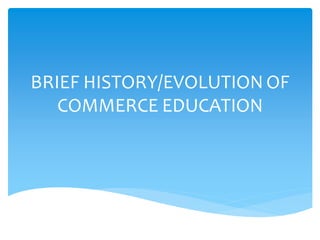Brief history /evolution of commerce education
•
1 like•1,167 views
Brief history commerce education Evolution of commerce education
Report
Share
Report
Share
Download to read offline

Recommended
Recommended
https://app.box.com/s/7hlvjxjalkrik7fb082xx3jk7xd7liz3TỔNG ÔN TẬP THI VÀO LỚP 10 MÔN TIẾNG ANH NĂM HỌC 2023 - 2024 CÓ ĐÁP ÁN (NGỮ Â...

TỔNG ÔN TẬP THI VÀO LỚP 10 MÔN TIẾNG ANH NĂM HỌC 2023 - 2024 CÓ ĐÁP ÁN (NGỮ Â...Nguyen Thanh Tu Collection
More Related Content
What's hot
What's hot (20)
Commerce- Meaning, Definition, Importance & Scope.pptx

Commerce- Meaning, Definition, Importance & Scope.pptx
Education contribution of dr. radhakrishnan assnt i

Education contribution of dr. radhakrishnan assnt i
EDUCATIONAL THINKERS & CONTRIBUTION Swami vivekananda

EDUCATIONAL THINKERS & CONTRIBUTION Swami vivekananda
Recently uploaded
https://app.box.com/s/7hlvjxjalkrik7fb082xx3jk7xd7liz3TỔNG ÔN TẬP THI VÀO LỚP 10 MÔN TIẾNG ANH NĂM HỌC 2023 - 2024 CÓ ĐÁP ÁN (NGỮ Â...

TỔNG ÔN TẬP THI VÀO LỚP 10 MÔN TIẾNG ANH NĂM HỌC 2023 - 2024 CÓ ĐÁP ÁN (NGỮ Â...Nguyen Thanh Tu Collection
Recently uploaded (20)
Energy Resources. ( B. Pharmacy, 1st Year, Sem-II) Natural Resources

Energy Resources. ( B. Pharmacy, 1st Year, Sem-II) Natural Resources
TỔNG ÔN TẬP THI VÀO LỚP 10 MÔN TIẾNG ANH NĂM HỌC 2023 - 2024 CÓ ĐÁP ÁN (NGỮ Â...

TỔNG ÔN TẬP THI VÀO LỚP 10 MÔN TIẾNG ANH NĂM HỌC 2023 - 2024 CÓ ĐÁP ÁN (NGỮ Â...
Basic Civil Engineering first year Notes- Chapter 4 Building.pptx

Basic Civil Engineering first year Notes- Chapter 4 Building.pptx
Web & Social Media Analytics Previous Year Question Paper.pdf

Web & Social Media Analytics Previous Year Question Paper.pdf
Role Of Transgenic Animal In Target Validation-1.pptx

Role Of Transgenic Animal In Target Validation-1.pptx
Z Score,T Score, Percential Rank and Box Plot Graph

Z Score,T Score, Percential Rank and Box Plot Graph
Python Notes for mca i year students osmania university.docx

Python Notes for mca i year students osmania university.docx
ICT role in 21st century education and it's challenges.

ICT role in 21st century education and it's challenges.
On National Teacher Day, meet the 2024-25 Kenan Fellows

On National Teacher Day, meet the 2024-25 Kenan Fellows
This PowerPoint helps students to consider the concept of infinity.

This PowerPoint helps students to consider the concept of infinity.
Asian American Pacific Islander Month DDSD 2024.pptx

Asian American Pacific Islander Month DDSD 2024.pptx
Brief history /evolution of commerce education
- 1. BRIEF HISTORY/EVOLUTION OF COMMERCE EDUCATION
- 2. Systematic records of business transaction were maintained in every times by Babylonians, Egyptians, Indian and Romans. Fra Luca Pacioli (Father of Book keeping) published his classical book on book keeping “Everything about Arithmetic, Geometry and proportion” in the year 1494, so this year considered to be land mark in the history of Book keeping.
- 3. This book contained principles of book keeping. He was an Italian and therefore Double Entry book keeping is called Italian method. In India the formal teaching of book keeping was started in 1886 in the first commerce school established in Madras, by the Trustees of Pachyappa Charities.
- 4. In 1895 GOI made provision for teaching of book keeping in the school of Commerce at Calcutta. 1903 the Presidency College Culcutta strated Book keeping classes. In the first decade of the 20th centruary, teaching of book keeping and accounting was started in several commercial institution.
- 5. First College of Commerce in India was established in the year 1913 in Mumbai ‘Sydenham College of Commerce and Economics’.(This college was the first college of Commerce in Asea). Then the degree (B.Com) was first given by this college in 1914, M.Com in 1925.
- 6. The commerce graduate of the college were recognised a Professional A/c. In 1926 Commercial college got affliated to University of Delhi. The Indian Institute of Banking established in 1926 had Book keeping and Accounting as on the subject.
- 7. In 1928, the Hartog committee recomented diversified courses at the secondary stage and included Book keeping and Accounting as a subject in the curriculum. In 1935 the Central Advisory Board of Education (CABE) recommended the inclusion of Book keeping and Accounting at the secondary level.
- 8. In 1936 a committee on Vocational Education recommends that teaching for Book keeping should included along with other vocational subjects. The Sergent committee (1943-1944) appointed by the GOI, recommended the establishment of academic high school and technical high schools.
- 9. In 1944, The Institute of Cost and Works Accountants(ICWA)of India was started. In 1945 the Delhi Polytechnic introduced Commerce Education which included Book keeping and Accounting. 1948University Education Commission was set up and established UGC.
- 10. In 1949 the Institute of Chartered Accountants was established in New Delhi, through an act of Parliament. In 1952 UGC was established as an administration Institution to standardised colleges and universities education as funding agency.
- 11. In 1952 Secondary Education commission recommends to include commerce as one of the streams at secondary school level. The commerce stream included the following subject; ➢Commercial practice. ➢Book keeping. ➢Commercial Geography or elements of Economics and Civics ➢Short hand and Typewriting.
- 12. In 1957 the CABE recommended that the Teaching training colleges should provide for teaching of Book keeping and Accounting. In 1961 the CABE recommends for the setting up of four Regional Training Colleges for preparing teaching and promotion of subjects. In 1961 VKRV Rao committee recommended that commerce should be taught from class eleven rather than nine and it should consist of element of Book keeping and Commercial Geography.
- 13. In 1964 teaching of commerce was introduced in the regional college of education.